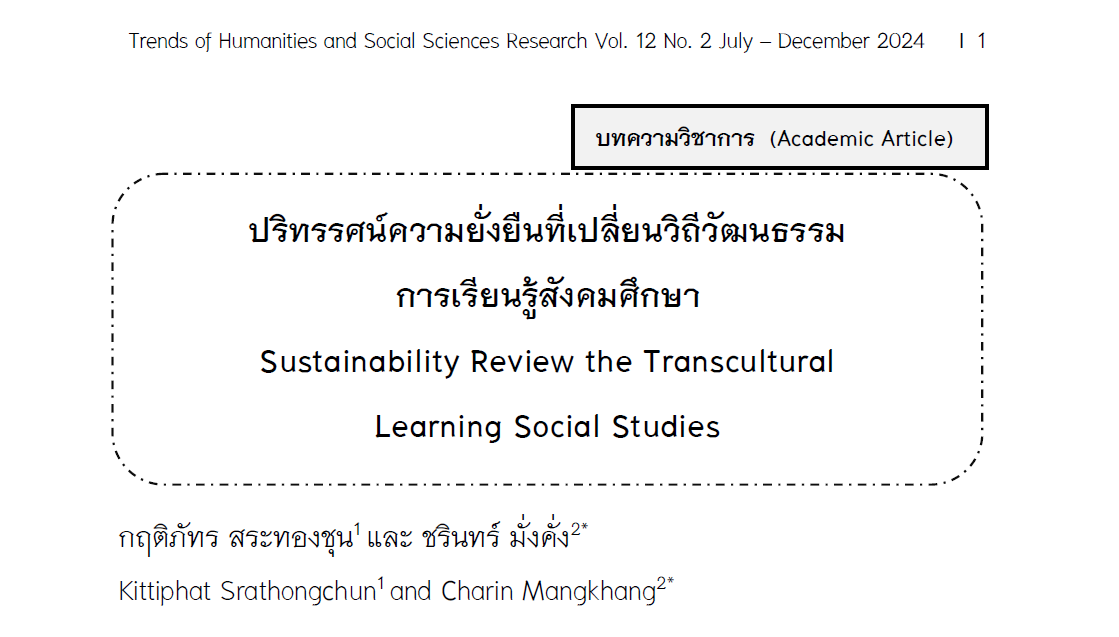Sustainability Review the Transcultural Learning Social Studies
Keywords:
Sustainability, Project-based learning, Conservation of natural resources, Sustainable development in the educational contextAbstract
This article aims to review the integration of sustainability concepts in social studies through project-based learning (PBL), focusing on developing critical thinking skills, problem-solving skills, and awareness of sustainable development issues. The study methodology involves document analysis and relevant case studies. The results indicate that PBL can help students understand the impacts of environmental, social, and economic issues in local contexts. However, there are limitations in terms of resources and curriculum application. The article proposes solutions through community collaboration, curriculum improvement, and quality-based assessment to promote more effective teaching and learning.
Thus, project-based learning (PBL) promotes important skills such as critical thinking, problem-solving, and collaboration, connecting knowledge to real life and sustainability. Unlike rote teaching that limits deep understanding, PBL helps create engaged students who are aware of their role in society and develop sustainably.
References
กระทรวงศึกษาธิการ. (2551). หลักสูตรแกนกลางการศึกษาขั้นพื้นฐาน พุทธศักราช 2551. ม.ป.พ.
แจ่มนภา ล้ำจุมจัง, สุนันทา กลิ่นถาวร และ ธรัช อารีราษฎร์. (2566). การสังเคราะห์รูปแบบการเรียนรู้แบบโครงงานด้วยเทคโนโลยีดิจิทัล เพื่อส่งเสริมการคิดวิเคราะห์. วารสารวิชาการการประยุกต์ใช้เทคโนโลยีสารสนเทศ, 9(1), 87-99. จาก https://ph02.tci-thaijo.org/index.php/project-journal/article/view/249329.
ชญาณี ขวัญชูนุช. (2564). การจัดการเรียนรู้โดยใช้เกมจำลองสถานการณ์ (Simulation gaming): Tropical Paradise วิชาการบริหารและการจัดการท่องเที่ยว 1. DeSec-Journal Articles, 105-109. จาก https://ir.swu.ac.th/jspui/handle/123456789/27931.
ชรินทร์ มั่งคั่ง. (2565). ปัญญาการสอนสังคมศึกษา. เชียงใหม่: ลานนาการพิมพ์.
ฐิฏิภัทร์ เดชพิพัฒน์วรกุล, กฤษณา คิดดี และ ศิริรัตน์ เพ็ชร์แสงศร. (2563). ผลการจัดการเรียนรู้โดยใช้โครงงานสะตีมเป็นฐานด้วยกระบวนการออกแบบเชิงวิศวกรรมที่มีต่อความสามารถในการแก้ปัญหา สำหรับนักเรียนระดับชั้นมัธยมศึกษาปีที่ 2. วารสารศึกษาศาสตร์ มหาวิทยาลัยนเรศวร, 25(1), 117-130.
ธันย์พศุตม์ พรหมมา. (2566). การพัฒนาการเรียนรู้โดยใช้โครงงานเป็นฐาน (PBL) วิชาภูมิศาสตร์ สำหรับนักเรียนชั้นประถมศึกษาปีที่ 6. วารสารครุศาสตร์วิชาการ มหาวิทยาลัยราชภัฏเชียงราย, 8(2), 173-186. จาก https://so05.tci-thaijo.org/index.php/jeducrru/article/view/265169.
ธีรพัฒน์ วงศ์คุ้มสิน และ เฉลิมขวัญ สิงห์วี. (2563). การจัดการเรียนรู้แบบใช้โครงงานเป็นฐาน เพื่อพัฒนาการเรียนรู้ด้วยการนำตนเอง. วารสารสังคมศาสตร์และมนุษยศาสตร์ มหาวิทยาลัยเกษตรศาสตร์, 46(1), 218-253. จาก https://so04.tci-thaijo.org/index.php/socku/article/view/241841.
พจนา มาโนช. (2567). ปรัชญาการศึกษาตามหลักปรัชญาหลังนวยุคสายกลาง. วารสารสถาบันพอดี, 1(9), 1-14. จาก https://so16.tci-thaijo.org/index.php/IS-J/article/view/1025.
พิชญา กล้าหาญ และ วิสูตร โพธิ์เงิน. (2564). การพัฒนากิจกรรมการเรียนรู้ตามแนวคิดกระบวนการคิดเชิงออกแบบร่วมกับการจัดการเรียนรู้โดยใช้โครงงานเป็นฐาน เพื่อส่งเสริมความเป็นนวัตกรของนักเรียนชั้นมัธยมศึกษาปีที่ 4. วารสารครุศาสตร์ จุฬาลงกรณ์มหาวิทยาลัย, 49(2), 1-16. DOI: 10.58837/CHULA.EDUCU.49.2.13.
วิภาพรรณ พินลา และ วิภาดา พินลา. (2561). การจัดการเรียนรู้สังคมศึกษาในยุคศตวรรษที่ 21. กรุงเทพฯ: ศูนย์หนังสือแห่งจุฬาลงกรณ์มหาวิทยาลัย.
ศูนย์วิจัยอนาคตศึกษา ฟิวเจอร์เทลส์ แล็บ. (2564). อนาคตของความยั่งยืน. กรุงเทพฯ: บริษัทต้นกล้าการพิมพ์ จํากัด.
สำนักงานนโยบายและแผนทรัพยากรธรรมชาติและสิ่งแวดล้อม. (2564). การประเมินผลกระทบสิ่งแวดล้อม. สืบค้น 16 พฤศจิกายน 2567, จาก https://sdgs.nesdc.go.th/sdgs/.
สำนักงานสภาพัฒนาการเศรษฐกิจและสังคมแห่งชาติ. (ม.ม.ป.). เกี่ยวกับ SDGs. สืบค้น 14 พฤศจิกายน 2567, จาก https://alumni.mahidol.ac.th/sustainability/.
แสงงาม นิธิภคพันธ์, ทัศนีย์ มูลคำปลิว, ดวงจันทร์ แก้วกงพาน, ชิสาพัชร์ ชูทอง และ สุดาภรณ์ สืบสุตัน. (2564). การจัดการเรียนรู้วิทยาศาสตร์โดยใช้ชุมชนเป็นฐาน (Community Based Learning: CBL) เพื่อส่งเสริมผลสัมฤทธิ์ทางการเรียนวิทยาศาสตร์และทักษะ ในศตวรรษที่ 21 ของนักเรียนชั้นมัธยมศึกษาปีที่ 1. วารสารสหวิทยาการเพื่อการพัฒนา มหาวิทยาลัยราชภัฏอุตรดิตถ์, 11(1), 111-125. จาก https://so06.tci-thaijo.org/index.php/GRAURU/article/view/246734.
อุไรวรรณ คัชพงษ์ และ ประจบ ขวัญมั่น. (2566). การประเมินโครงการส่งเสริมความสัมพันธ์ระหว่างโรงเรียนกับชุมชนของสถานศึกษาขนาดเล็ก สังกัดสำนักงานเขตพื้นที่การศึกษามัธยมศึกษากำแพงเพชร. วารสารการพัฒนาชุมชนและคุณภาพชีวิต, 11(3), 248–259. จาก https://so02.tci-thaijo.org/index.php/JCDLQ/article/view/263636.
อำพร ดัชถุยาวัตร และ ลดาวัลย์ มะลิไทย. (2566). การจัดกิจกรรมการเรียนรู้สังคมศึกษาเพื่อส่งเสริมความเป็นพลเมืองโลกในผู้เรียน. วารสารมหาจุฬาคชสาร, 14(1), 63-74. จาก https://so06.tci-thaijo.org/index.php/gajasara/article/view/264731.
Buchanan, L. B., & Crawford, E. O. (2015). Teaching for sustainability in a social studies methods course: Opportunities and challenges. Social Studies Research and Practice, 10(2), 135-156.
Farrell, A., & Hart, M. (2010). What does sustainability really mean? The search for useful indicators. Environment: Science and Policy for Sustainable Development, 40(9), 4-31.
Giovannoni, E., & Fabietti, G. (2014). What is sustainability? A review of the concept and its applications. In C. Busco, M. L. Frigo, A. Riccaboni, & P. P. Quattrone (Eds.), Integrated reporting, 21-40.
Leal Filho, W., Raath, S., Lazzarini, B., Vargas, V. R., de Souza, L., Anholon, R., Quelhas, O. L. G., Haddad, R., Klavins, M., & Orlovic, V. L. (2018). The role of transformation in learning and education for sustainability. Journal of Cleaner Production, 199, 286–295. Form: https://doi.org/10.1016/j.jclepro.2018.07.017.
Panagiotakopoulos, P., Espinosa, A., & Walker, J. (2015). Integrated sustainability management for organizations. Kybernetes, 44(6/7), 984-1004. Form: https://doi.org/10.1108/K-12-2014-0291.
Rabie, M. (2016). A theory of sustainable sociocultural and economic development. Springer.
Ramsey, J. L. (2015). On not defining sustainability. Journal of Agricultural and Environmental Ethics, 28(6), 1075–1087.
Roseland, M. (2000). Sustainable community development: Integrating environmental, economic, and social objectives. Progress in Planning, 54, 73–132.
Salas-Zapata, W. A., & Ortiz-Muñoz, S. M. (2019). Analysis of meanings of the concept of sustainability. Sustainable Development, 27(1), 153-161.
THAIRATH ONLINE. (2023). รู้จัก SDGs กับ 17 เป้าหมาย “การพัฒนาที่ยั่งยืน" มุ่งรักษาสิ่งมีชีวิตทุกชนิดบนโลก. Future perfect. สืบค้น 16 พฤศจิกายน 2567, จาก https://www.thairath.co.th/futureperfect/articles/2722753.
World Commission on Environment and Development. (1987). Our common future. Oxford University Press.

Downloads
Published
How to Cite
Issue
Section
License
Copyright (c) 2024 Phayao University

This work is licensed under a Creative Commons Attribution-NonCommercial-NoDerivatives 4.0 International License.
ผู้นิพนธ์ต้องรับผิดชอบข้อความในบทนิพนธ์ของตน มหาวิทยาลัยพะเยาไม่จำเป็นต้องเห็นด้วยกับบทความที่ตีพิมพ์เสมอไป ผู้สนใจสามารถคัดลอก และนำไปใช้ได้ แต่จะต้องขออนุมัติเจ้าของ และได้รับการอนุมัติเป็นลายลักษณ์อักษรก่อน พร้อมกับมีการอ้างอิงและกล่าวคำขอบคุณให้ถูกต้องด้วย
The authors are themselves responsible for their contents. Signed articles may not always reflect the opinion of University of Phayao. The articles can be reproduced and reprinted, provided that permission is given by the authors and acknowledgement must be given.







